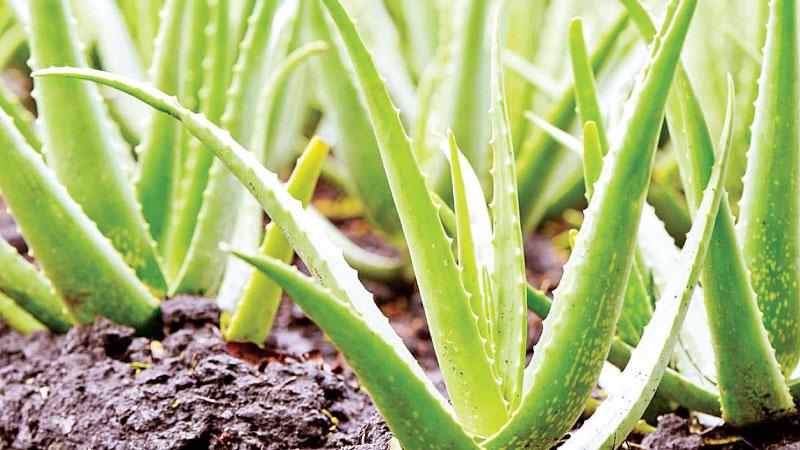
There are many ways to be beautiful naturally and many plants and trees growing in our gardens or neighbourhood are sources of beauty remedies and medicine.
The Egyptians called it the ‘plant of immortality’ and believed it could make you immortal. It is none other than the Aloe vera plant easily found and which can be found almost everywhere in tropical countries and even in your garden.
It is called komarika in Sinhala and katralai in Tamil. In Hindi it is Ghritkumari and in Sanskrit aloe vera is kumari meaning young girl. The name Kumari is given due to the fact that several ailments afflicting young girls are treated with medicines containing aloe vera.
Aloe vera is a succulent plant of the genus Aloe. An evergreen perennial, it has thick and fleshy leaves which store water. The gel from the plant is used in a wide range of products.
This plant originated in Arabia and is widely found in the tropics.
The very first record of an aloe vera plant appears on a stone tablet written in Sumerian dating around 2100 BC. But other evidence suggests aloe vera was used long before this to treat a wide range of illnesses and ailments. Aloe vera was popular with the Egyptians, Romans, Greeks, Indians and the Chinese.
In Egypt, Aloe vera was associated with the gods and was regarded as a sacred plant with immortal properties. Egptian Queens used this plant to maintain and enhance their beauty. As it has anti fungal and anti bacterial properties Aloe vera was also used by the Egyptians for embalming.
In Greek and Romans eras the Aloe vera was quite rare. Alexander the Great captured a number of islands where the Aloe vera plant was plentiful and soon incorporated Aloe vera into the rations of his armies. The Roman Emperor Nero’s healer travelled the length and breadth of the known world searching for new ways to use Aloe vera and documented his findings about the medicinal uses of Aloe vera and some of it stands true even today.
It is believed that the Chinese used Aloe vera daily. In Sweden an elixir called ‘Swedish B itters’ was used as a substitute for bloodletting in the treatment of sickness. This elixir was Aloe vera juice mixed with juices of other medically beneficial plants. The man who created this elixir is believed to have lived for over a hundred years.
In the Middle Ages Aloe vera was used in England by nuns and monks to treat people who came to convent s and monasteries seeking help for their medical problems. Aloe vera was commonly used by them to treat ulcers and gastro intestinal problems. It also formed a part of the cargo sent to the New World with Christopher Columbus and was used to treat ailments of sailors on ships.
Aloe vera figures prominently in Ayurveda treatment too. It is known as komarika and according to Ayurveda Aloe vera tastes bitter but balances all three doshas and is cold in potency. In Ayurveda Aloe vera is used to treat constipation, skin problems, bleeding disorders and diseases due to Pitta aggravation.
Among the many benefits Aloe vera brings to the skin are prevention of the signs of aging, moisturising, acne reduction and lightening blemishes, helping with sunburn and tan reduction, lessening stretch marks and healing of external wounds and insect bites.
Aloe vera promotes hair growth while reducing dandruff and maintains the Ph balance in the scalp and conditioning the hair.
The health benefits of Aloe vera include treatment of mouth ulcers and burns, reduction of dental plaque and reduction of constipation. According to a study in Phytomedicine : International Journal of Phytotherapy and Phtopharmacy two tablespoons of Aloe vera juice daily can cause blood sugar levels to fall in people with type two diabetes. A study published in General Dentistry reports that Aloe vera in tooth gels is as effective as toothpaste in fighting cavities.
